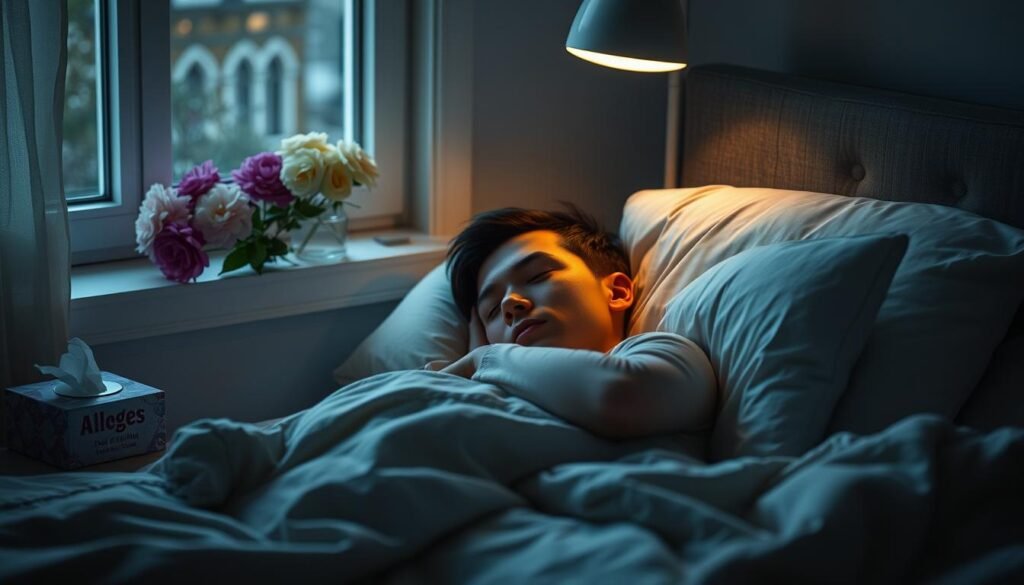Did you know more than 50 million people in the US face allergies each year? Many of them deal with allergy fatigue. This isn’t just about common symptoms like coughing or sneezing. Fatigue from allergies is often overlooked. It comes from the body fighting off allergens, causing inflammation and daily disruption.
Our article digs into allergy-induced fatigue and its effects on life. Triggers vary widely, from pollen to pet dander. Handling these allergens is key to feeling better and full of energy.
Key Takeaways
- Allergy fatigue can severely impact daily life and mental health.
- Identifying and avoiding allergens is essential to managing allergy-induced fatigue.
- Symptoms may include brain fog, irritability, and reduced motivation.
- Effective treatments range from antihistamines to allergen immunotherapy.
- Consulting healthcare professionals is vital for personalized management strategies.
What is Allergy Fatigue?
Allergy fatigue is when you feel tired all the time, even after you rest. It gets worse during certain seasons or around specific allergens. Understanding it can help manage its effects better.
Defining Allergy Fatigue
Allergy fatigue is linked to our immune system fighting allergens like pollen or pet dander. It can make you feel very tired, sleepy, and less clear mentally. This tiredness makes daily tasks hard.
How It Differs from Regular Fatigue
Allergy fatigue and normal fatigue are different. Normal tiredness might come from not enough sleep or hard exercise. But allergy fatigue comes from our bodies reacting to allergens. Unlike normal fatigue, rest doesn’t fix allergy fatigue. It shows our immune system is working hard and needs special care.
If you’re dealing with allergy tiredness, it’s key to find out what you’re allergic to. Keeping your space clean and using medicines like antihistamines can help. Looking into ways to manage allergy fatigue can boost your life quality.
The Science Behind Fatigue from Allergies
Understanding how allergies cause fatigue is important for finding relief. The body’s defense system reacts to allergens by releasing specific antibodies and histamines. These lead to allergic reactions and make a person feel tired.
The Immune Response to Allergens
Allergens make the immune system react as if there’s danger. This leads to the quick release of antibodies and histamines. Symptoms like sneezing and sinus pressure arise. They use up a lot of energy, making people tired during the allergy season. Over 40% of those with allergies say they often feel tired.
The Role of Histamines in Causing Exhaustion
Histamines signal the body to swell in some areas. This can make breathing harder and mess up sleep. Troubles like congested sinuses make it hard to sleep well, which increases tiredness. Fighting these symptoms non-stop can make someone constantly tired. Getting the right treatments, like finding what triggers your allergies and taking good meds, can help with the tiredness.

Common Allergy Triggers that Lead to Fatigue
Many people feel tired because of allergy-induced fatigue. Common triggers play a big role in energy levels and general health. Knowing what these triggers are helps manage symptoms and fight the tiredness that comes with allergies.
Pollen and Seasonal Allergies
Pollen from plants like trees, grasses, and weeds causes seasonal allergies. These allergies can make people very uncomfortable. When you breathe in pollen, your body fights back by releasing histamines. This fight makes you sneeze and congested. It also makes you feel very tired, especially when there’s a lot of pollen around.
Indoor Allergens: Dust Mites and Pet Dander
Indoor allergens, including dust mites and pet dander, are common all year. They cause long-lasting allergic reactions. This keeps your immune system very busy, leading to fatigue. People often find it hard to sleep because symptoms get worse at night. This makes it tough to stay awake and alert during the day.
Mold and Food Allergies
Mold and certain foods can also make you feel very tired because of allergies. Being around mold can cause serious allergic reactions, respiratory problems, and tiredness. Some foods might make you feel sluggish and easily annoyed. If you’re allergic to certain foods, it’s really important to watch what you eat. This can help you avoid feeling extremely tired from allergies.

| Allergen Type | Symptoms | Impact on Fatigue |
|---|---|---|
| Pollen | Sneezing, congestion, itchy eyes | Significant fatigue during peak allergy season |
| Dust Mites | Respiratory issues, itchy skin | Chronic fatigue from year-round exposure |
| Pet Dander | Nasal congestion, coughing | Ongoing tiredness due to persistent exposure |
| Mold | Respiratory discomfort, headaches | Fatigue from allergic symptoms and stress |
| Food Allergens | Digestive discomfort, irritation | Occasional to chronic fatigue depending on reaction |
Understanding Allergy Fatigue Symptoms
Allergy fatigue affects our bodies and minds in many ways. It can change how we go about our day. Knowing the signs of allergy fatigue symptoms helps us deal with them better.
Physical Symptoms of Allergy Fatigue
People often see clear signs of allergic tiredness. These signs include:
- Persistent tiredness
- Runny or stuffy nose
- Postnasal drip
- Itchy or watery eyes
- Coughing or sneezing
These issues can make sleeping hard because of nose stuffiness or breathing problems. This poor sleep makes us feel even more tired. Also, histamine from allergens messes with our sleep, making us more tired.
Mental Symptoms: Brain Fog and Concentration Issues
Mental tiredness is a big part of allergy fatigue symptoms, too. People may have trouble with:
- Cognitive impairments
- Forgetfulness
- Difficulties maintaining focus
This problem is often called “brain fog.” It can hurt our work and social life. Understanding these effects helps us find ways to cope. To get better, consider looking into lifestyle changes and supplements that improve health.

Complications from Untreated Allergy Fatigue
Ignoring allergy fatigue affects a person’s health deeply. Untreated symptoms can complicate daily life and health. The tiredness from allergies reduces not just physical energy but mental focus too. This creates a cycle that keeps the fatigue going.
Impact on Sleep Quality and Daily Life
Untreated allergies make sleeping hard because of ongoing nasal congestion and discomfort. This leads to poor sleep and tiredness all day. People then struggle with daily tasks, lowering productivity and life quality.
Additionally, ongoing tiredness can cause stress and anxiety. The effort to deal with lasting allergy symptoms wears heavily on the mind.
Potential Long-term Health Risks
Ignoring allergies for too long can bring about serious health issues. For example, chronic sinusitis can cause ongoing facial pain. It can also worsen asthma, requiring more frequent inhaler use. In extreme cases, food allergies may lead to anaphylaxis, needing urgent care. These health problems show why it’s vital to deal with allergies promptly.
It’s key to know how to handle and prevent untreated allergy fatigue issues. Identifying allergens through tests helps. For those looking to fight off the sluggish feeling allergies cause, physical activity could really help improve energy and health. Learn more about these methods here.
Managing Allergy-related Fatigue
Understanding your allergy triggers is key to managing fatigue. Testing helps identify these allergens, such as pollen or pet dander. With test results, you can avoid these triggers. This is crucial for energy recovery.
Methods like skin prick and blood tests reveal which substances worsen symptoms. Knowing your triggers allows you to build strategies. These strategies help combat tiredness caused by allergies.
Identifying Allergens Through Testing
Allergy tests help find what makes you tired. Pollen, mold, and pet dander are common culprits. They worsen fatigue by disturbing your sleep. Seeing a doctor and getting tested clarifies your allergy profile.
Strategies to Avoid Triggers
To manage fatigue, reduce allergen exposure. Here are some tips:
- Create an allergen-free environment by keeping windows closed during high pollen counts.
- Use air purifiers to remove particles from the indoor air.
- Regularly vacuum and wash bed linens and towels to eliminate dust mites and dander.
- Incorporate nasal sprays or Neti pots to clear congested nasal passages.
- Take hot showers before bed to wash off allergens and help open nasal passages for better sleep.
Working with an allergist can also help. They can offer a plan tailored to you. Combining different strategies can reduce symptoms and improve life quality. Investing time in managing allergies can boost your well-being.
Treatment Options for Allergy Fatigue
When dealing with allergy fatigue, finding the right treatment is key. It helps improve energy and well-being for those affected. There are many ways to tackle allergy fatigue symptoms.
Medications: Antihistamines and Decongestants
Many people use over-the-counter meds like cetirizine and loratadine to fight allergy symptoms. However, about 10% may feel sleepy from these, leading to more fatigue. Talking with a doctor can help pick the best medicine.
Decongestants help by easing nasal congestion. But, they can cause sleep issues, headaches, and high blood pressure. This is tough for those already tired. Also, using nasal decongestants too much can make congestion worse.
Immunotherapy: Allergy Shots
For ongoing allergies, immunotherapy, or allergy shots, is a good long-term fix. These shots slowly make the body less sensitive to allergens. This can cut down on allergy fatigue. Many say it makes their daily life better.
Though helpful, immunotherapy has downsides. These include irritation where the shot was given and allergy symptoms like sneezing. Very rarely, a severe reaction could happen. It’s vital to have these treatments done safely by professionals. Knowing these options can give hope to those with allergy fatigue.
Combating Allergic Exhaustion in Daily Life
If you feel tired because of allergies, making some lifestyle changes can really help. These changes are aimed at reducing tiredness caused by allergies. They also make your day-to-day life more energetic.
Lifestyle Changes to Enhance Energy Levels
Adopting healthier habits can truly change your life. Doing regular, moderate exercise helps your immune system. It can also make your sleep better, reducing fatigue.
Eating anti-inflammatory foods is also key. Foods like fatty fish, leafy greens, and nuts boost your health and energy.
Improving Sleep Hygiene for Better Rest
Good sleep habits are essential for fighting allergy-related tiredness. It’s important to sleep in a space that’s free from allergens. To achieve this, follow these tips:
- Maintaining a consistent sleep schedule
- Using air purifiers to reduce allergens
- Avoiding screen time before bed to promote better sleep quality
- Practicing relaxation techniques such as deep breathing and meditation
Making these changes can help you feel less tired and enhance your life quality. Acting against allergies improves not just sleep but overall well-being too.
Conclusion
Allergy fatigue is a big but often ignored problem in the U.S. About 7.1 million kids experience environmental allergies. This leads to symptoms like tiredness and trouble focusing in school. It’s very important to understand the causes, spot the symptoms, and know what triggers allergies.
Being constantly inflamed due to allergies can make you feel more tired and even lead to depression. To fight this, avoiding allergens and getting the right medical care can help a lot. For example, newer antihistamines like cetirizine in Zyrtec are less likely to make you sleepy than old ones. Also, allergy shots can be a good long-term fix for some, helping ease allergy tiredness.
To beat allergy tiredness, taking care of these things is key. This can mean keeping your space clean, handling stress well, or talking to doctors. It’s all about knowing how your body reacts to allergens and finding the best way to manage your allergy fatigue.